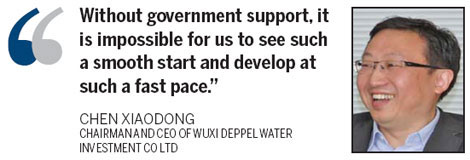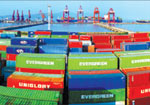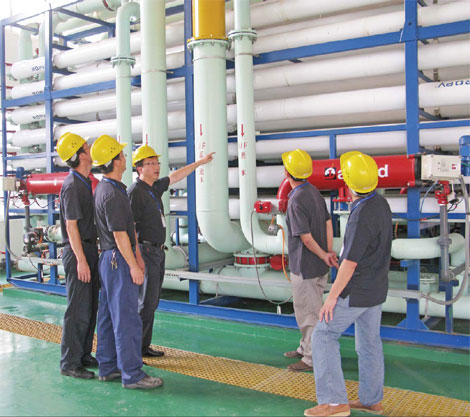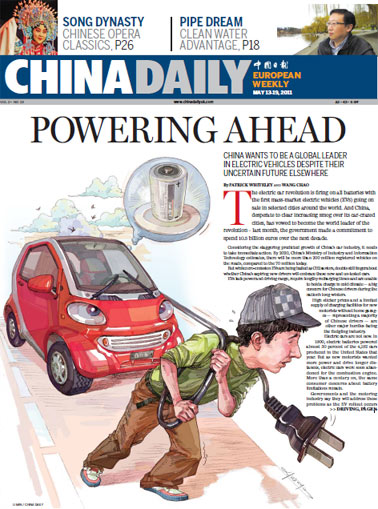Fueling the circular economy
Updated: 2011-05-13 10:30
By Qian Yanfeng (China Daily European Weekly)
|
|
|
The Wuxi facility of Deppel Water Investment Co is able to reclaim 10,000 tons of wastewater every day. Provided to China Daily |
Recycling scarce water resources gets major boost
Companies like Suntech and Hynix Semiconductor are making headlines worldwide for their cutting-edge technology, but one man who has played a major green role in their success remains relatively obscure.
Chen Xiaodong, chairman and CEO of Wuxi Deppel Water Investment Co Ltd, has focused on one thing in the past four years: Turning acid-rich industrial effluents otherwise destined to taint waterways into ultrapure water that can be reclaimed and used again by the same companies.
With a daily treatment capacity of 30,000 tons, Deppel's Wuxi facility is now able to reclaim 10,000 tons of wastewater every day. Most of the wastewater comes from Hynix, one of the largest semiconductor manufacturers in the world.
Over the years, Deppel has also been able to expand out of Wuxi into neighboring cities like Suzhou and Changzhou, where China's leading solar panel producers such as Canadian Solar and Trina Solar have found Deppel an ideal solution to their wastewater treatment and recycling.
Thanks to Deppel's advanced technologies, these companies minimize their environmental impact and save their consumption of water resources that are becoming increasingly scarce.
"From a technological perspective, it's just about making putrid water clean again. But, from a social and environmental viewpoint, it's about maximizing recycling and conservation of limited resources and being responsible to the environment," says Chen, 44, an overseas returnee from Germany who also worked and lived in the United States in the energy sector for many years before setting up his own company in 2007 in Wuxi.
Chen's entrepreneurial experience is one perfect example of the painstaking efforts by the Chinese government and business community to tackle mounting environmental challenges in China's fast changing urban landscape.
In a city like Wuxi, where the outbreak of the blue-green algae calamity at heavily polluted Taihu Lake in May 2007 disrupted clean water supplies for several weeks, Chen says strong government support and growing public awareness on environmental protection and resource conservation has been vital to his success.
The pollution scandal, which prompted a citywide crackdown on polluting enterprises and heralded industrial restructuring in the region, has changed Chen's fortune and catapulted his company to the frontline in the battle against pollution in the region.

Supported by the local government, construction for the company started immediately after the breakout of the algae bloom as part of the broader efforts to address excessive pollution from decades of breakneck industrialization and lax enforcement of environmental regulations.
"The water crisis has undoubtedly prompted the local government to take immediate action to fight pollution and promote a circular economy. Without government support, it is impossible for us to see such a smooth start and develop at such a fast pace," says Chen, adding that the government has offered subsidies and tax preferential policies to support its development.
Chen is also among the first batch of entrepreneurs to be supported by a talent cultivation program from the local government.
The move aims to introduce 30 leading returned overseas entrepreneurs in five years to help them start high-tech companies and accelerate the city's industrial restructuring.
Aside from such government support, Chen is also able to leverage his overseas networks and introduce advanced technologies from Germany and Singapore in wastewater treatment.
By combining overseas experience with China's unique conditions, his team has managed to develop a number of patents in the sector in just four years.
Although the company was initially designed to treat and recycle wastewater only from Hynix in Wuxi New District, its success soon spread wide and afar and attracted many more customers. It has expanded its customer portfolio in the region to include Suntech Power and the Wuxi factory of Murata Manufacturing Co Ltd.
Although making a profit still seems far for a company that "serves the public good",
Chen has full confidence in the outlook of his business as he believes the rising awareness on environmental protection and resource conservation will one day spell huge demand for services offered by companies like his.
"As the economy develops and more enterprises come about with increasing demand for water, the conservation of water resources will undoubtedly become a top priority," he says.
"I think the success of my company has built belief and encouraged investment in a sector which boasts not simply economic, but also social benefits, although overall China's environmental protection sector is still at a very preliminary stage of development," he says, adding that the increasing exchanges between China and other countries in the environmental sector such as renewable energy is one demonstration of the progress China has made.
"Many Chinese cities like Wuxi have made conscientious efforts to clean up the environment and highlight sustainability in their development," he says.
"With that in mind, I'm sure it promises a great future for the sector."
E-paper

War of the roses
European Chinese rose growers are beating their Chinese rivals at their own game
Preview of the coming issue
High-tech park gets big boost
At the source
Specials

New wave
Coastal city banks on marine sector to ride next stage of economic development

Drunk driving
Drunk drivers face a detention for one to six months and a revokation of their drivers' license.

V-Day parade
A military parade marking the 66th anniversary of the Soviet victory over Nazi.

